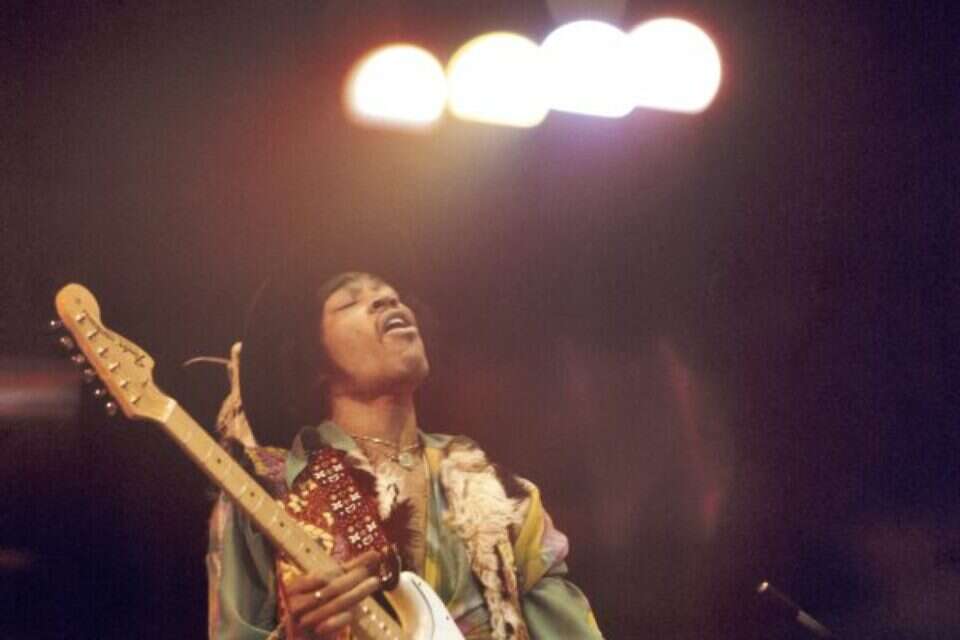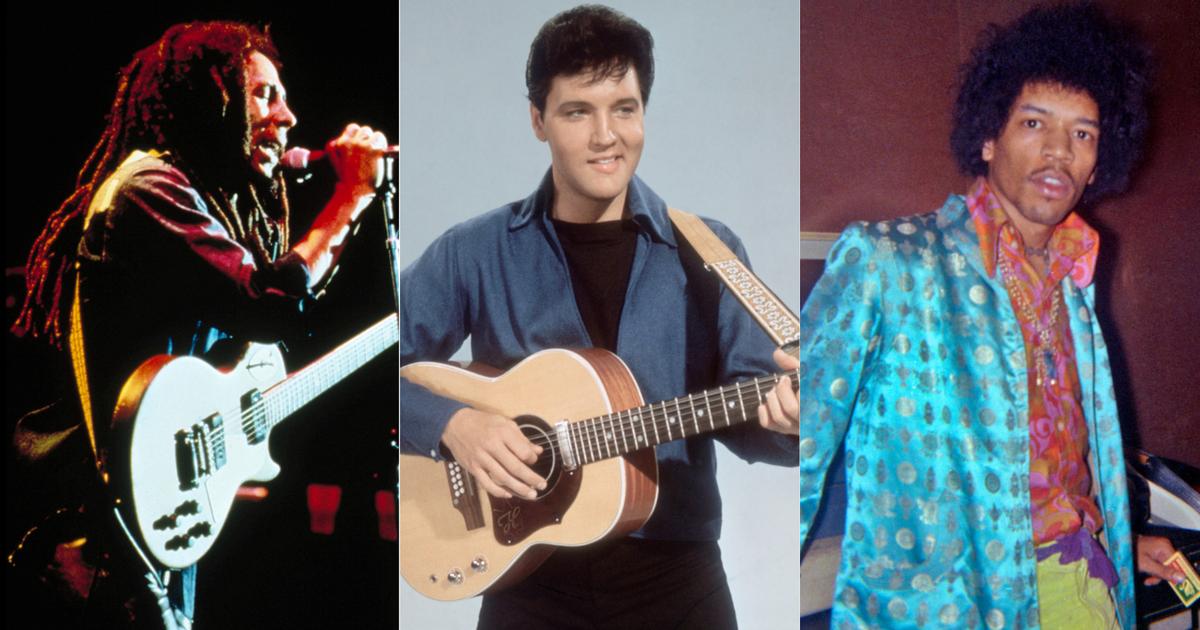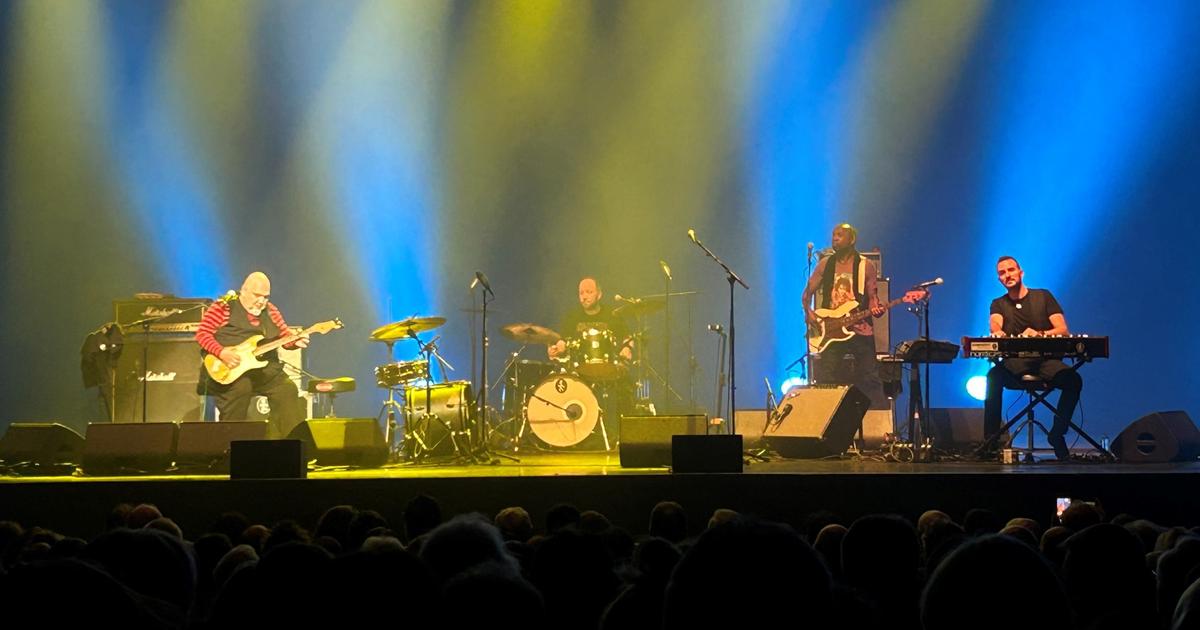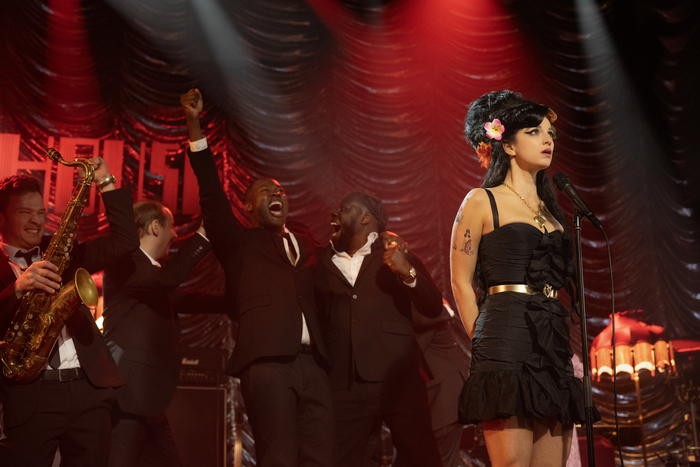This coming Sunday, the great guitarist Jimi Hendrix was supposed to celebrate his 80th birthday.
Unfortunately for the music world, he didn't even get to attend his 30th birthday.
In September 1970, when he was 27 years and ten months old, Hendrix returned his soul to the Creator, but to this day, more than 52 years after his passing, there is almost no ranking that does not place him as the greatest guitarist of all time.
The other places on the list will be contested by icons such as Eric Clapton, Jimmy Page, David Gilmour and Brian May.
it does not matter anymore.
"Clapton is my God in terms of playing the guitar," says Yehuda Ader, the founder and president of the Rimon Music School, and who was the lead guitarist of the legendary Tamuz band in the mid-1970s.
"I don't need to hear him to understand, but Hendrix is the only one I haven't seen anyone come close to. True, they know how to play him, but the gap between what he got out of his hands and those who try to imitate him is crazy. Something about his playing is so unique, so not Similar to no one else. I saw him play the American national anthem at the Woodstock festival, and to this day I don't understand what he did there. I look at his fingers and don't understand. The most complex and complicated things, and effortlessly. Magician."
There is almost no great guitarist in Israel and in the world who does not say that Hendrix was the one who gave him a push in the beginning, and continues to influence him even today.
"I discover it every time anew, and especially since I became a singer and guitarist," says Yizhar Ashdot from the band Tislam, who at the same time developed a successful solo career.
"I learned a lot from him about the ability to express myself and become one machine that sings and plays."
Shmulik Bodgov, the veteran guitarist of the Baruch band, who played on the first album of the Jewish band, also talks about the influence he received from the late artist.
"In the album with the Jews, I know how to point out the point in the song 'Take Me'. It's not a copy, but the spirit of things is here. I grew up on Hendrix, I breathed him."
What is amazing about Hendrix is not only his death at such a young age, but the limited span of years in which he starred and managed to influence generations - from the end of 1966 until his death, with a total of four albums in four years.
"There is some kind of anomaly in this period," Ashdot, who celebrated his 64th birthday this week, is convinced. Years changed everything. Look what happened to the Beatles in such a short period of time, especially between 1966 and 1967. In one year they completely changed music."
In order to understand Hendrix's tremendous influence, you have to go back, to the background and roots from which he grew.
The great guitarist was born in 1942 to a low-income family in Seattle and grew up in a rough neighborhood, saturated with alcohol and violence, from which only a few found their way out.
The first instrument he played was the ukulele, and at the age of 15 he bought his first acoustic guitar for five dollars.
He practiced for hours to imitate leading blues players such as Muddy Waters and B.B.
King.
But life was not easy.
After he was caught twice driving stolen vehicles, he was given a choice: going to prison or being drafted into the army.
Hendrix chose to enlist.
He joined the paratroopers battalion in May 1961 and survived there for a year and two months until he was released.
His commander wrote about him: "Private Hendricks will never be able to reach the standards required of a soldier. I feel that the army will benefit with his release as quickly as possible."
Hendrix returned to music, in which he excelled.
He founded a band called King Casuals and went on the road, performing in the so-called Chitlin' Circuit, a series of venues in the southeastern United States. Among other places, he visited Birmingham, Alabama, and Lexington, Kentucky - places that were not easy for a black artist in the 60s appear in them.
There were places where he was not allowed to enter the bathroom because of the color of his skin, cities where taxi drivers did not stop him.
"It was difficult to operate in the black music market at that time," explains Dr. Ari Katorza, who wrote books and articles about the world of music at that time. "The bosses were harsh, and the possibilities of expression for the guitarist were limited, certainly in soul music that is not aimed at playing guitars.
Hendrix had to find his unique way, and he came to New York, and there he was able to put everything together."
Hendrix arrived in the Big Apple in 1966.
He called himself Jimmy James, and the band that accompanied him - the Blue Flames.
He found his place in all kinds of small halls that agreed to give him a stage.
The first to notice him was the model Linda Keith, who was then dating Keith Richards, guitarist of the Rolling Stones.
Keith, who had been exposed to a lot of music in her life, did not understand what a genius like Hendrix was doing in such a humble place.
"I couldn't believe how he hadn't been kidnapped yet," she said later, "he was amazing. The charisma, the abilities, the stage presence."
"The first rows are wet"
Hendrix was different from the other musicians.
A virtuoso who played guitar with his teeth, behind his back, and writhed on stage.
He was dressed like a peacock, and his whole appearance radiated freedom and breaking conventions.
Linda invited Andrew Logue Oldham, who was managing the Rolling Stones at the time, to witness the miracle, but the manager left the hall disappointed.
Another guitarist, he thought to himself.
Keith decided to invite another friend to be impressed - Ches Chandler, who was the bass player of the Animals and was interested in managing artists at the time.
Hendrix's performance took place at Cafe Wah?
in Greenwich Village.
The producer Bob Gulick, who was present that evening, told in an interview with "Guitar Player" magazine about the incident.
"I looked at Chandler, and his mouth was open in astonishment. When Jimmy started playing 'Hey Jude' with his teeth, Chandler's drink fell and spilled on his pants. I'm sure Chase realized then what happened - Jimmy In those moments, he wiped the floor with all the guitarists that Chess had known until then. There wasn't a person who saw him play and didn't think he was an idol."
Chandler realized that he had a once-in-a-lifetime opportunity.
He met with Hendrix after the show and convinced him to come to London, to open himself to the British audience.
"There is a good chance that if Hendrix had stayed in America, he would have been considered just another nice guitarist and nothing more," Dr. Catorza, a guitarist himself, is convinced, "the fact that he took off for London changed his life and was for him a great fortune."
London in the second half of the 1960s was a tough place musically.
The Beatles were already at their peak, the Rolling Stones gave the lead, and if we talk about great guitarists - then names like Jeff Beck and of course the young Eric Clapton, who was already famous as a star of the band Crimea (Kefat), shone there.
Chandler knew that time could not be wasted and that it was better to throw his talent straight into the deep water.
He brought Hendrix to a Cream concert in London.
"Jimmy asked if he could play some parts," Eric Clapton recalled in one of his interviews.
"I said 'of course', and I had a bit of a strange feeling about him. He played at those moments in almost every imaginable style, and not in a show-off, although there were also the familiar tricks of playing with the teeth and behind the back. But that's it, he got off the stage - and my life We changed forever. He blew everyone's minds."
Chandler connected Hendrix with promoter Michael Jeffery, who was managing the Animals at the time, so that both would raise the new musical sensation.
They added bassist Noel Redding and drummer Mitch Mitchell to him, and together they created the Jimi Hendrix Experience.
Everyone came to see and hear the new guitarist.
At one of Hendrix's concerts, it was said that Brian Jones from the Rolling Stones went outside during a break and met a musician there who was about to enter the hall.
"Be careful, all the first rows are wet," warned Jones.
The musician did not understand the cause of the flood, and Jones explained: "It's from the crying of the other guitarists in the hall."
Yizhar Ashdot: "Jack Bruce, Crimea's bassist, said that Clapton said at the end of that night that he wanted to retire. You see Clapton, in the months after, appearing in pictures with an Afro hairstyle. Everyone saw Hendrix that night, went home and went to practice again On the guitar, learning what you can do with it."
Hendrix at the Woodstock Festival, 1969,
"Eruption of the Unconscious"
Electric guitar is an old instrument that was invented many years before the arrival of Hendrix.
There are hundreds of thousands of professional guitarists in the world, among them are amazing virtuosos - but Hendrix was and remains one, unique and different.
Dr. Catorza: "He wasn't the fastest, his knowledge of theory and harmony was minimal, but he had a vision of how a guitar should sound.
Eric Bardon of the Animals said he took it from the Mississippi Delta to Mars, and indeed his music sounded like that.
He combined visions of sound, feeling and eruption of the unconscious, and he expressed it through the guitar and technology.
He introduced effects such as the use of the vibrato handle, the wah-wah effect, which is very much identified with him.
The electric guitar sounded different after Hendrix arrived."
Yitzhak Klefter (72), the legendary guitarist of Hive, who later led a magnificent solo career, says that at first it was difficult for him to digest Hendrix's unique playing style.
"I heard him on his first record, and the first time I wasn't enthusiastic, because I didn't understand and I didn't like the style. He came with effects we didn't know, and I treated it with suspicion, until I slowly fell in love. The fact that he was an inventor made him the best guitarist in the world."
Clifter, who released a Hebrew version of "Kenaf Katana", one of Hendrix's greatest songs, adds: "He was my source of inspiration and you can hear it when I play the blues. Even Slash from Guns and Roses said there was no other player like Jimmy."
Hendrix not only invented, he also played differently than others.
He was left-handed, playing with an upside-down guitar.
"Hendrix played all kinds of guitars, but as soon as he discovered the Fender Stratocaster he made it the most popular guitar in the world," says Dr. Catorza. "Why did he choose it?
Because he was left handed, so when he turned the guitar over - the volume and tone knobs were on top, close to his long hands.
He was comfortable playing, and he was able to shape the sound with her.
There were all kinds of guitarists who preceded him and played Fender, such as Hank Marvin from the Shadows and Buddy Guy, but there is no doubt that since Hendrix discovered it, it has become dominant."
The 74-year-old guitarist Shlomo Mizrahi, known as the "Israeli Hendrix", still plays the music of the one he considers the king.
"Many say 'Shlomo plays no less well than Hendrix', and really when I play in good conditions I can bring his spirit and sound to the stage," he smiles.
"I proved it in the years I performed in Europe. People didn't believe that someone played one-on-one like him. It's something in the soul, in love, in emotion, in pain, sadness, joy, a set of things."
Isaac Clifter.
"He is my source of inspiration when I play the blues", photo: Kafir Ziv
How would you describe Hendrix's playing?
"He had the perfect pairing between emotion and imagination. If he had been born in Mozart's time, he could have written classical music. Hendrix was not only a guitar player, he was also a genius musician who produced his amazing sound already at the age of 23. He just connected to the instrument, and from there He took out his voice. I don't look down on any guitarist, I respect everyone, but I haven't seen another guitarist for whom it came from such a deep place in his soul."
Hendrix arrived in Israel a little late, especially after the film documenting the Woodstock festival in 1969 was released in early 1970. That's when we were exposed to the great wonder that plays the guitar.
"Most of us fell in love with Hendrix through Woodstock," says Ashdot, "after all, in Israel we were terribly disconnected. There were only two music programs a week, where you could hear new things. Hardly any music newspapers from abroad came to Israel, and every now and then you saw a Beatles clip on TV .
When Woodstock came - it was a significant event."
Yehuda Ader (71) was born and raised in Kibbutz Kfar Hanasi, and part of the musical education he received was given to him by the volunteers who came to the farm from abroad. But it was Danny Sanderson who introduced him to Hendrix, whom Ader replaced in the Nahal band.
"Efraim Shamir and Danny Sanderson would play Hendrix, and when Danny taught me guitar - he taught through Hendrix," recalls Adar.
"Danny has lived for years in the US and breathes this music.
Hendrix had a record called 'Band of Gypsies', so we would play it, and Danny played 'on it' - and that's how he explained to me how to play."
Even Shmulik Budgov (67)'s first steps on the guitar remind him of Hendrix.
"We used to learn to play solos through the turntable," he says.
"I remember at the flea market I found a player that could slow down to half the standard speed of a record. I would listen to the playing in slow motion, and that's how I learned Hendrix's solos. I still have that sound in my ear, because I plowed through the man's every sound. After all, what made my son My generation of good guitarists? The way. There were no teachers then, and we learned the most difficult solos in history. To learn Hendrix's 'Along the Watchtower'? I memorized it for days and nights."
Yizhar Ashdot at Hendrix's grave. "I learned from him about the ability to become one machine that sings and plays", photo: from the private album
And did you play Hendrix?
"In the workshops I do for children, I tell that there used to be no DJ, and that the concept of playback did not exist. As 14-year-old boys, we were members of a rhythm band and performed in dance clubs. The youth danced to Hendrix, Led Zeppelin, Pink Floyd - the most amazing rock music in all The times. Music is a language, and when Hendrix came out, we, the guitar players, were shocked. We heard a language we didn't know."
Hendrix, with all the success, often had trouble finding his place.
Some were angry at his version of the American national anthem at Woodstock, claiming it was unpatriotic and demeaning to the symbol.
Jeremy Wells, an English professor at Indiana University, actually speculated that the guitarist wanted to tell Americans how far they had strayed from their values.
Black audiences argued that Hendrix was more aimed at the white man's taste than his origins.
Two weeks after stunning the world on the Woodstock stage, Hendrix took the stage in Harlem, New York, in what he called "a show for his people" - and a bottle thrown at him narrowly missed him.
Hendrix was pained by the attitude towards him, but told a New York Times reporter: "Sometimes, when I come here, people say, 'He's playing rock for white people, what's he doing here?'
Well, I want to show them that music is universal, that there is no such thing as white and black rock."
About a decade ago former basketball player Lamont Robinson founded the Rhythm and Blues Hall of Fame, and in 2016 Hendrix was also included in it, in a place of honor.
"If they were to build a Mount Rushmore for black music, Jimmy's face would have to be there, along with Aretha Franklin and Michael Jackson," explained Robinson.
Didn't make heaps of money
Hendrix filled venues, sold millions of albums, but in retrospect it turned out that he never made large piles of money.
More than once he admitted to himself that he has no idea about financial management.
"I have no value for money," he said in an interview, "that's my only mistake. I only get things I want to put in my music."
Later, Ches Chandler, the man who discovered Hendrix in New York, pointed an accusing finger at promoter Michael Jeffery, claiming that he made sure to empty the artist's coffers.
"Michael was the most immoral person you could ever meet," Chandler said, "He was charming and fun - and could steal from my grandmother. You probably have to give the devil his due. He was smart to get away with fooling us for so long." A lot of time".
Years after Hendrix's death, one of Hendrix's staff members, James Wright, claimed that Jeffrey was the one who killed Hendrix following the guitarist's desire to get rid of the promoter.
The claim was rejected by Hendrix's associates, who claimed that the end of his life was a tragic accident.
By the way, Jeffrey didn't live long either: he was killed in 1973 in a plane crash in France.
Hendrix walked resolutely towards his death.
Already in 1969 he was caught with heroin at the airport of Toronto, Canada, and towards the end of his life he was already quite wiped out by massive drug use.
Guitarist Steve Miller, who knew him, said: "In 1970 his band had a huge show, and they looked bad, couldn't play, just made noise. All I wanted to do was take Jimmy home and save his life, but no It was possible to get close to him. Four months later he died."
Hendrix breathed his last at the Samarkand Hotel in Notting Hill, London on September 18, 1970. He was staying there with his friend Monica Denman.
The two of them drank wine the night before, walked around outside, returned to the hotel, fell asleep at seven in the morning - and four hours later, when Monica woke up, she found the guitarist vaguely conscious.
It turns out that Hendrix also took a bunch of sleeping pills, and eventually choked to death.
"At the time, I was in the band Fun Tikva Tova, and we were rehearsing in Holon," recalls Shlomo Mizrahi, "a close friend came into the room and said: 'Guys, shut up,' and then she looked at me and said: 'Shloma, last night Jimi Hendrix died.' We were all shocked."
Yizhar Ashdot was an 11-and-a-half-year-old boy when he learned of the death of the legendary Elilo.
"I already had a poster of him above the bed then," he says, "I remember going to the store, buying a black ribbon and hanging it on the poster. Four years ago I was on tour in the western US, and when I performed in Seattle I of course went to his grave, which is not far from the city." .
Hendrix in a hotel in New York, 1968. "He blew everyone's mind", photo: GettyImages
"What would Prince be without him?"
The great guitarists of the past are a fading world.
Eric Clapton is already 77 years old, Jimmy Page from Zeppelin is 78 years old, David Gilmour from Pink Floyd is 76 years old, Richie Blackmore, who starred in Deep Purple, is 77 years old, Brian May from Queen is 75 years old - and this is a partial list.
And yet, 52 years after his death, Hendrix's influences can be seen everywhere you hold a guitar.
"There is no guitarist in the field of rock who has not been influenced by him over the years," Dr. Catorza is convinced, "John Frusciante from Red Hot Chili Peppers is one such, and how can you understand Prince without Hendrix?
Everyone enjoys guitarists differently, but Hendrix's contribution to rock guitar is enormous - and that's why he's always at the top of the rankings.
He is the Gandalf of rock and roll."
were we wrong
We will fix it!
If you found an error in the article, we would appreciate it if you shared it with us





/cloudfront-eu-central-1.images.arcpublishing.com/prisa/ELBVFZH2DRHMJMYSCFHMSYYR34.jpg)

/cloudfront-eu-central-1.images.arcpublishing.com/prisa/TD4CG4QZY5HIDHUZSVWLMOSM4M.jpg)






